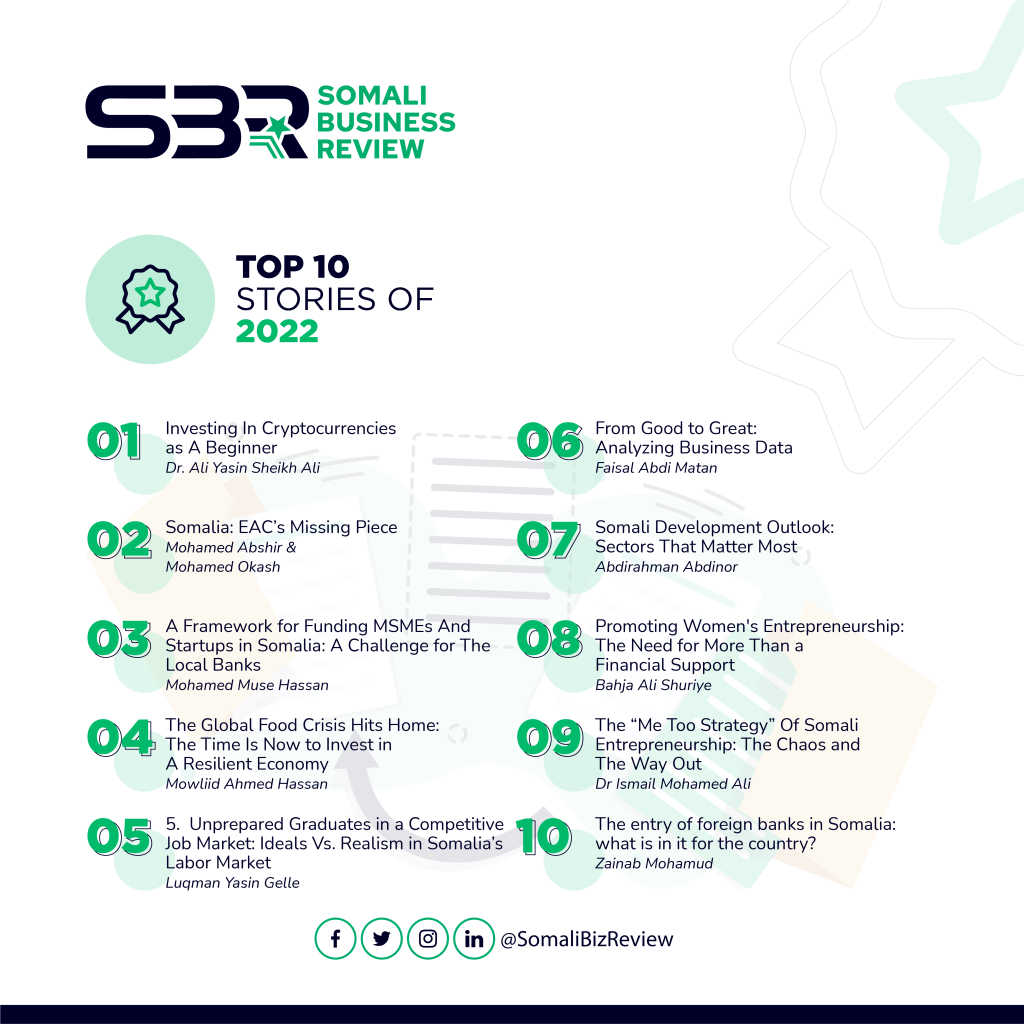What happened in the last 12 months? Did we move for the better or revered back? The fact of the matter is 2022 has many things. Some events shaped the course of our direction, others exacerbated the existing crisis, and while others discovered potential bright spots. The economic performance more specifically the GDP growth is projected to slow to 2.2% in 2022, from 2.9% in 2021. The annual financial and compliance audit report from the Office of Auditor General stressed alarming issues of the overall economic governance in Somalia to the “non-Disclaimer opinion”. On the hand, Somalia hosted the first of its investment summit to attract national and foreign direct investment to rebuild the nation and fuel the recovery of socioeconomic transformation. Moreover, as we are getting ready for the new year, we thought it will serve as a joy for our readers to reflect on. In this regard, we pulled up the top ten stories of the year based on views of the pages from Google Analytics (GA4). We hope you enjoy reading our stories and best of luck for 2022.
“A common mistake new investors make when analyzing Crypto tokens is making decisions based solely on the market cap and maximum supply of the coins. Albeit, these aspects have a significant influence on the price and prospects of a coin there are some other crucial aspects that must be considered to make a better decision. These include the prospects of the coin as a future medium of exchange, as well as the value-added benefits they provide.” – Dr Ali Yasin
2. Somalia: EAC’s Missing Piece
“The question now is, when and not if Somalia will accede to EAC. Somalia’s accession to the EAC will take approximately 2 years, with the satisfaction of EAC’s condition of Articles 3 and 4 of the Treaty for the Establishment of the EAC. These conditions include respect for universal principles of good governance, democracy, the rule of law, respect for human rights and other civil liberties.” – Mohamed Abshir & Mohamed Okash

3. A Framework for Funding MSMEs And Startups in Somalia: A Challenge for The Local Banks
“We have tested this model at SIMAD iLab, the innovation hub of SIMAD University. Our partnership with Premier Bank allows us to take in startups in our incubation programs. The best performers in the program get recommended to the bank for investment. Udug Flowers is a fitting example of this partnership. This was an idea-stage startup that graduated from the incubation program of SIMAD iLab. With our recommendation, Premier Bank invested in the startup. Udug Flowers now has two branches in Mogadishu. A journey from an idea-stage startup is now a startup with two branches employing almost five permanent staff members. The startup is also now planning to stop importing flowers from Kenya and Ethiopia and establish a local manufacturing plant for flowers in Somalia. And all of this has happened within the span of one year.” – Mohamed Muse Hassan
4. The Global Food Crisis Hits Home: The Time Is Now to Invest in A Resilient Economy
“Even though food price hikes are felt globally, low- and middle-income economies are getting hit hardest due to the fragility and vulnerabilities in their social infrastructures. According to the World Bank July 2022 food security report, 8 of the top 10 countries experiencing the worst price increases are from Africa and Asia. Lebanon tops the list with a staggering 122% annual food inflation increase, while Sri Lankan government declared bankruptcy, closed schools, and banned the sale of petrol to control the looming fuel and food crisis. The World Bank further added that the Eastern African countries would be more likely to see situations “worsen” due to the persisting rainfall shortages, recurrent droughts and the growing prices of essential items.” – Mowliid Ahmed Hassan
5. Unprepared Graduates in a Competitive Job Market: Ideals Vs. Realism in Somalia’s Labor Market
“Many other graduates still hope to join this tiff market while unprepared. Even the basics of CV writing and the ability to articulate oneself, if given the opportunity, remain significant obstacles. Worse even, is the reluctance most of these graduates have towards learning, applying to jobs, creating or/and strengthening helpful networks and asking for a guide. Simply put, unprepared graduates wish to partake in a competitive market.” – Luqman Yasin Gelle
6. From Good to Great: Analyzing Business Data
“It is not a secret that everyone would love to have their data analyzed and have their decision-making process informed by insights from the business data. However, it is a bit scary to most of the medium-sized business owners in Somalia let alone the micro and small business owners. One of the reasons I have understood over the years is the ‘getting out of the comfort zone in dealing with technology and trusting an external person to see your business data. Although I would argue that “you really need your data to talk to you because it will benefit you first more than anyone else”, I won’t. I will instead ask if I can give a tip or two to help you analyze your own data and see what it says to you.” – Faisal Abdi Matan
7. Somali Development Outlook: Sectors That Matter Most
Geographically, Somalia locates in the horn of Africa, with the second-longest coastline in Africa. It has a global shipping line that connects the Indian Ocean to the Mediterranean Sea. “Mainly the climate of Somalia is different from the typical climates that lie astride the equator. The soil types of the country are determined by the climate and parent rock which has a large influence on the soil formation and the nature of the resulting soil. The most important economic sectors are mainly agriculture, livestock, and fishing which revolves around the catch, canny, or export. Politically, Somalia has a federal parliamentary system of government in which the seats for members of parliament are elected based on an agreed clan system. Stable politics that prioritize national interests with an open mind to the world dynamics, developments, and resources are essential for the vision of 2050 Somalia.” – Abdirahman Abdinor
8. Promoting Women’s Entrepreneurship: The Need for More Than a Financial Support
“Developing entrepreneurial skills also significantly impacts on empowering and promoting women’s entrepreneurship. The need for knowledge, information, entrepreneurial mindset and technological skills to operate businesses exists. These kinds of services should be provided by the Business Development Service Providers (BDSPs). Women-owned companies either fail or grow slowly, mainly due to a lack of mentorship and incubation services. However, there are hubs launched in many parts of the country—iRise, SIMAD iLab, and Har Hub are among them. The rise of these initiatives is becoming the new normal in Somalia. The hubs should prioritise training young people and women. SIMAD iLab hugely encourages women entrepreneurs by reserving a 50% quota in the entrepreneurship, incubation, technology, and employment mentorship programs to develop and grow their start-ups. Other programs are dedicated exclusively to female entrepreneurs to raise the bar. This includes the Ladies Talk Event—through this social event, aspiring women entrepreneurs get connected, and exchange insights with pioneered women entrepreneurs. Webinars and Field Tours are among the programs intended to increase women’s engagement in mentorship programs. SIMAD iLab also hosts a Product Fair Day, which showcases the products and services of the start-ups accelerated or incubated at the centre. The product fair is an opportunity for young female entrepreneurs to exhibit their businesses and market their products and services” – Bahja Ali Shuriye
9. The “Me Too Strategy” Of Somali Entrepreneurship: The Chaos and The Way Out
“Nothing wrong with prioritizing the target audience, but the potential business risks can also be ignored. The definition of risk is mainly up to the entrepreneur as it varies from one business to another. It could be a new technology that becomes a game-changer. It could be an underestimated cost of installation and poor launching. Substitute products can divert the customer’s interest. Risk can come from the lack of rules and regulations that govern the whole business industry and cater for the survival and growth of new business startups. The gap created by the lack of law has possibly led to the chaos existing in the local market. It is the chaos of imitating and “copycatting” other people’s business ideas. Worse than that is when your own idea is copied next to your shop, sometimes with little modification to the original name. Then it is reproduced again and again as it becomes comprehensible to the public.”- Dr Ismail Mohamed Ali
10. The entry of foreign banks in Somalia: what is in it for the country?
“Regarding Somalia, it’s one of the nations that foreign investors are checking out and are interested in its commercial opportunities and business information. The majority of foreign investors have been focused on extracting and exporting natural resources. But then after going there, they changed their opinions on mining and natural resources, and now focus on telecommunications, financial institutions, retail, and other business services. So far, the Bank of Egypt and Turkey’s Ziraat Katilim, which are both state-owned, have expressed interest in entering the Somali financial institution sector. And the board of the Central Bank of Somalia has granted those banks’ applications for a license, making them the first foreign banks to do business in Somalia.” – Zainab Mohamud
Mohamed Okash, Editor-In-Chief, SBR


